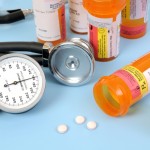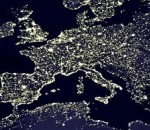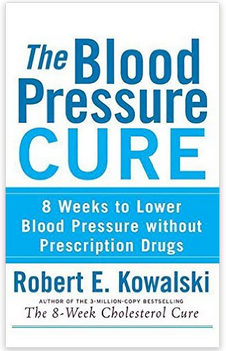A recent study suggested that taking hypertension medicines at night may control blood pressure more effectively and significantly lower the risk for diabetes.
This is the blurb from the article:
A dip in blood pressure during sleep is normal, and a nighttime dip of less than 10 percent in systolic pressure (the top number) is known to be associated with a higher risk of death.
Researchers studied 2,012 men and women with high blood pressure. Their average age was 53, and none had diabetes at the start of the study. The researchers randomly assigned half of the people to take all their hypertension medicine at night, and half to take it all in the morning.
Over an average of six years, 171 developed diabetes. After adjusting for fasting glucose, waist circumference, mean sleeping blood pressure and other factors, those who took their medicine before going to sleep had a 57 percent lower risk for diabetes. Taking medications at night also resulted in a greater relative decline in nighttime blood pressure. The study is in Diabetologia.
“We are recommending now that patients take the meds in the evening. It’s a no-cost intervention,” said the lead author, Ramón C. Hermida, a professor of biomedical engineering at the University of Vigo in Spain, adding that patients should not change their medication regimens without talking to their doctors.
As to this study, I don’t actually have access to the whole paper. However, these points come to mind:
- Night-time taking makes hypertensive medication “more effective”? The title of the article (though not that of the paper) suggests that taking hypertensive medication at night makes the medication more effective. As hypertensive medicines have the main purpose of lowering blood pressure, the title of the article is a little imprecise (i.e. more effective in terms of blood pressure regulation or just has the added effect of reducing diabetes risk?)
- Was daytime blood pressure regulation affected? Did the researchers monitor daytime blood pressure after switching medicine-taking to the evening hours? It is all very well to reduce diabetes risk, but people on hypertensive medication are mainly concerned with regulating their blood pressure first and foremost. So, was blood pressure regulation overall better, or at least as good, when taking hypertensive medication at night? The results section mentions “lower asleep BP mean” (a good thing, as explained earlier); the abstract concludes “ambulatory BP was better” in the night-time medicine taking group. Need more detail really, but without access to the paper…
- What hypertensive medication? Was this diabetes-lowering effect observed for ALL hypertensive medications when taken at night or just for some types (as there are several available)? Did everyone in the study take the same medication? Does this apply to people who take just one medication or more than one? The results section confirms that at least 3 different classes of medications were taken and suggests some took more than one. The conclusions of the study simply say that the effect was seen mainly in those medications “modulating or blocking the effects of angiotensin II” (and the results section seems to suggest the best results were seen with angiotensin receptor blockers or ARBs). But it is unclear what exact effect taking a “cocktail” of hypertensive medication would have on these results – and this is an important point, as many people take 2 or 3 different drugs to control their blood pressure.
* Before you start taking your hypertension medication at night, please consult your doctor *
Also remember, there are many other things we can do to control our blood pressure, particularly if you are “pre-hypertensive” and want to delay your need for medication…
We have known for years that:
- a single bout of exercise reduces systolic blood pressure (the high number) by several points up to 22 hours. So aim to walk or exercise daily. Our Friday Vitality circuit is suitable for those with blood pressure issues or those wanting to avoid them! There is no lying down on the floor, and its format is developed out of the cardiac rehab exercise training I took.
- stress reduction techniques (belly breathing, meditation etc) help reduce hypertension due to stress
- eat a healthy diet with lots of fruit and vegetables for optimal cardiovascular health. It tastes great and keeps you healthy! In particular, garlic regulates blood pressure (and has many health benefits, (unsalted!) watermelon seeds have been shown to reduce blood pressure, cayenne pepper is often called a cardiovascular system tonic. Here are some ideas:
The following steps are recommended by the NHS website:
- Cut your salt intake to less than 6g (0.2oz) a day. Find out how you can reduce the amount of salt in your diet.
- Eat a healthy, low-fat, balanced diet, including plenty of fresh fruit and vegetables. Get tips on eating more healthily.
- Be active: being physically active is one of the most important things you can do to prevent or control high blood pressure. Get tips on being more active.
- Cut down on alcohol. Get tips on cutting down, download a drinks diary and keep track of your drinking.
- Lose weight. Find out what your ideal weight is using the BMI healthy weight calculator.
- Stop smoking. Smoking greatly increases your chances of getting heart and lung diseases. Get help quitting.
- Drink less coffee, tea or other caffeine-rich drinks such as cola. Drinking more than four cups of coffee a day may increase your blood pressure.
Want to know more? Prefer a book? Here below is the best seller out of all of the books I sell on Amazon.co.uk (Amazon seller: cisono): (or get it directly from me, just ask!)
The Blood Pressure Cure: 8 Weeks to Lower Blood Pressure without Prescription Drugs Paperback
To your health,
References:
Article: http://buff.ly/1LaSbf5
Paper: http://link.springer.com/article/10.1007/s00125-015-3749-7
NHS website:
http://www.nhs.uk/Conditions/Blood-pressure-%28high%29/Pages/Treatment.aspx
Images: secondscount.org, NASA.gov, Top10HomeRemedies.com
Blood Pressure Cure Book:
http://sn.im/blood_pressure_cure
http://goo.gl/mCqjbE




